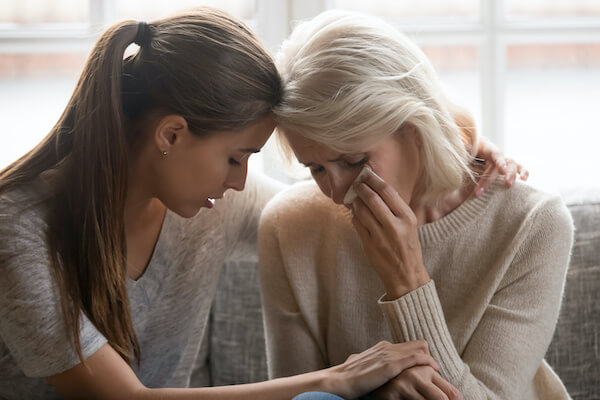
Coping with Bereavement
The loss of a loved one is an overwhelming and painful experience. Grief is a natural reaction to this loss. The grieving process, while difficult, is an important step in healing. There’s no single right way to cope with bereavement as everyone is different so there’s no easy solution. However, there are small steps that can make coping more bearable and protect your mental health. Here we have some suggestions on how to cope with bereavement and grief.
Express Your Feelings
Grief is an overwhelming, emotional time so it’s important that you find a way to identify and accept how you are feeling. It’s normal to feel numb, and to shut off from other people, but ignoring the way you feel can be unhealthy in the long-term. Some people find if they don’t face grief head on, it can show itself in other ways, through ill-health or bad habits. So, allow yourself to feel the full weight of your emotions, whether they are sadness, anger, frustration, guilt or anxiety. Any and all of these emotions are a natural response to losing a loved one.
Don’t be afraid to cry and feel vulnerable. You don’t need to put on a ‘brave face’ or struggle in silence. You need to go through the motions and find a healthy way of expressing your feelings. A funeral can be a way to confront feelings, acknowledge grief but seek support among friends and family for coping with grief.
Look After Your Physical Health
When trying to cope with grief, many people neglect to take care of themselves which in turn has a negative effect on your mental health. Grief often causes disrupted sleep patterns and a loss of appetite. This can have a major impact on your physical health, which will only make you feel worse.
While you can’t make your grief disappear, keeping yourself physically healthy will give you the strength to deal with your emotions. Do this by keeping to a routine which gives a sense of structure and security during an otherwise uncertain time. Eat well by avoiding fast food, and instead eat more fruit and vegetables. This will instantly boost your mood.
Make sure to get some form of exercise. Whether it’s going to the gym or heading out for a simple walk, it’s a good opportunity to get out of the house and you will feel better for it. Go to bed on time, regardless of whether you feel tired or not. You may not fall asleep immediately, it may take time to get your sleeping pattern back to normal. There are a number of free apps that can provide you with meditations to help you sleep and calm your mind. All these will provide focus in at least one aspect of your life as you learn to cope with your grief.

Look After Your Mental Health
Mental well-being is equally important. Make sure you monitor your mood over time, as it is common for grief to contribute to anxiety and depression. If you’ve been feeling constantly low for a number of weeks or months on end, don’t be afraid to visit your GP who can refer you to bereavement counselling.
Bereavement charities can also offer extra support. Support groups allow people going through similar experiences to come together and share their feelings. Grief creates a strong bond between people and you can benefit from being among others who are on the same journey.
Find a Creative Outlet
After losing someone you love you may have put a lot of your life on hold. You may have lost enthusiasm for many things you once enjoyed. In time, when you feel ready to start healing, you should think about returning to hobbies and interests that you enjoyed before your loss. This can be a rewarding way to distract yourself occasionally and give you something to look forward to.
Creative hobbies like arts and crafts will give you a sense of achievement, while physical activities like sports will boost the chemicals in your brain responsible for positive emotions and keep you healthy. Even just doing little things you enjoy, such as listening to music or reading a book, can be a welcome relief. Discovering that you can find enjoyment in small things again can be an important part of healing.
Reach Out to Family and Friends
It’s easy to feel isolated after the death of a loved one. If you feel like you need to be alone, that is fine. You have to grieve in the way that seems right to you. But maintaining social relationships can be a way of getting the comfort you need. While it can be comforting to be around others who are experiencing similar feelings, be sure not to spend all your time with others who are grieving. Your family, friends and those close to you are your support network and you need to let them be there for you. Remember that small moments of laughter and happiness during grief are important and you do not need to feel guilty about them.

Remember Your Loved One
Dealing with grief does not mean forgetting your loved one. It may be that memories are difficult and painful for you at this time. On the other hand, many people find comfort in keeping their loved one’s memory alive. You could keep a few of their possessions in your home, or have a special photo album full of good memories. Then you can honour the memory of your loved one in a positive way.
Ignore Grief Expectations
People talk about grief happening in five stages: denial, anger, bargaining, depression and acceptance. In reality, emotions are much messier than this. Don’t let other people tell you how you should be feeling, or make you feel guilty for the way you are expressing grief. Take each emotion as it comes.The grieving process is different for everyone. What you are feeling is unique to you.
Create a place for you and your loved ones to grieve by setting up a memorial page.